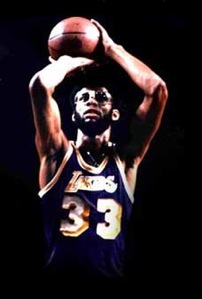When did I first understand that basketball is a universal language?
Certainly not as a boy in Brooklyn, when I was lamely missing baskets in my own backyard, opposing the much more athletic kids next door. Our netless excuse for a basketball hoop, tacked onto our doorless excuse for a garage (shared with the neighbors, hostile at every level from sports to paternal fistfights), certainly did not inspire me.

Maybe it was when I happened to have to be in New York on a certain Sunday when I also had to take (as a superannuated applicant who had already been an anthropology professor) the Medical College Admission Test. It so happened I was assigned to take it at Yeshiva University (in those days it was routinely given on Saturdays, but for reasons other than religion I was not available that Saturday).
So I took the test with a bunch of knit-kippahed (though they weren’t called that then) strapping young men who did what during the lunch break? You guessed it, they played basketball.
Now, it must say something uncomplimentary about me that I was astounded. Every cliché that a Jewish boy from Brooklyn could have in the 1970s about Yeshiva University-bochers (boys), I had. Let’s not go into it. But seeing these handsome, lithe, strong young men glide across the basketball court deftly dribbling and passing what to me had been a very unwieldy ball—as a break from, probably, trouncing me on the MCAT—well, I apologize, but I was astounded.
Fast forward to May 2011. I and my wife, who is on her first visit to Israel, have hired a high-class academic historian to tour us around the Old City (he was perfect: a German convert to Judaism in his teens who had later made aliya and was trying to become as fluent in Arabic as he was in Hebrew and English). We were walking around on the walls of the Old City, starting in the section overlooking the Christian Quarter.
And what do I remember most from that bird’s-eye view of the Christian Quarter? Basketball courts, attached to a high school I think. At that moment nobody was playing, but the courts were clearly well-kept and well-used. Okay, I thought. Basketball in the Old City of Jerusalem. In the Christian Quarter. Ancient churches, medieval churches, sacred space, basketball.
We had to walk briskly to keep up with our guide, but we next came to the Muslim Quarter. Looking down, what did I see? Or at least, what do I remember? Basketball. Not just courts this time, but two ongoing games, one played by boys, one by girls, including some girls covered in hijab, traditional headscarves. You could have knocked me off the wall of the Old City with a feather.
Okay, so I underestimated basketball. And I underestimated people. But I was getting the idea. So now all I needed was to see basketball in the Jewish Quarter. I didn’t, which is not to say it wasn’t there. But now something better has turned up. It’s called “The Rabbi and the Basketball Player,” and it goes like this.
Kareem Abdul-Jabbar, once known as Lew Alcindor, was in his time a legendary L.A. Lakers center, and perhaps the greatest basketball star of his era. In the 1970s he was a young African-American who became a convert to Islam and changed his name as a sign both of his religious commitment and his independence from white America. (I remember being chewed out, quite properly, one day, by a pro-Palestinian Jewish colleague for getting Abdul-Jabbar’s new name wrong.)

Fast forward again, to this coming July, when Kareem Abdul-Jabbar plans to fulfill a late-life charge given him by his father, Ferdinand Lewis Alcindor, Sr.: to make contact with someone the dad, as a member of the 761st Tank Battalion, had liberated from Buchenwald. This was, at the time, a seven-year-old boy.
Sixty-six years later the boy, now an elderly man, recalls how the dark-skinned American soldier took him to meet the German citizens of Weimar. "Look at this sweet kid,” the soldier said to them, “he isn't even eight yet. This was your enemy, he threatened the Third Reich. He is the one against whom you waged war, and murdered millions like him."
Who is the boy now?
Yisrael Meir Lau, the former Chief Rabbi of Israel and present Chief Rabbi of Tel Aviv, the scion of a rabbinic dynasty and a legendary figure in the Jewish world.
So next month, the famed Kareem Abdul-Jabbar, bright star of American basketball, and the legendary Rabbi Lau, shining star in the Israeli rabbinic firmament, will join forces at the Jerusalem Film Festival to premier a movie about their strangely and beautifully intertwined lives, and to build a bridge between two religions, two races, and two nations.
I think I can be forgiven now if I say that the arc of the bridge resembles the arc of a ball approaching a basket, sinking without touching the rim.
.

Nothing but net Mel! A great story indeed, but how do we reconcile Jabbar’s earlier invovlement with the Hanafi Muslims who seized the Bnai Brith HQ back in the ’70’s (http://www.time.com/time/magazine/article/0,9171,946751,00.html ).
This is a great story but won’t be complete until this chapter is clarified a bit.
Thanks,
Steve
that’s a beautiful story papa, and beautifully written.